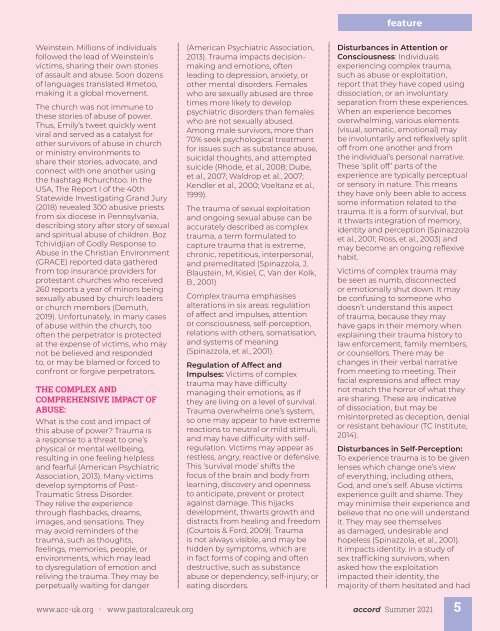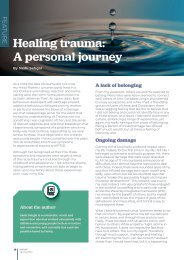ACC Accord Summer 2021 Issue 111
Create successful ePaper yourself
Turn your PDF publications into a flip-book with our unique Google optimized e-Paper software.
feature<br />
Weinstein. Millions of individuals<br />
followed the lead of Weinstein’s<br />
victims, sharing their own stories<br />
of assault and abuse. Soon dozens<br />
of languages translated #metoo,<br />
making it a global movement.<br />
The church was not immune to<br />
these stories of abuse of power.<br />
Thus, Emily’s tweet quickly went<br />
viral and served as a catalyst for<br />
other survivors of abuse in church<br />
or ministry environments to<br />
share their stories, advocate, and<br />
connect with one another using<br />
the hashtag #churchtoo. In the<br />
USA, The Report I of the 40th<br />
Statewide Investigating Grand Jury<br />
(2018) revealed 300 abusive priests<br />
from six diocese in Pennsylvania,<br />
describing story after story of sexual<br />
and spiritual abuse of children. Boz<br />
Tchividjian of Godly Response to<br />
Abuse in the Christian Environment<br />
(GRACE) reported data gathered<br />
from top insurance providers for<br />
protestant churches who received<br />
260 reports a year of minors being<br />
sexually abused by church leaders<br />
or church members (Demuth,<br />
2019). Unfortunately, in many cases<br />
of abuse within the church, too<br />
often the perpetrator is protected<br />
at the expense of victims, who may<br />
not be believed and responded<br />
to, or may be blamed or forced to<br />
confront or forgive perpetrators.<br />
THE COMPLEX AND<br />
COMPREHENSIVE IMPACT OF<br />
ABUSE:<br />
What is the cost and impact of<br />
this abuse of power? Trauma is<br />
a response to a threat to one’s<br />
physical or mental wellbeing,<br />
resulting in one feeling helpless<br />
and fearful (American Psychiatric<br />
Association, 2013). Many victims<br />
develop symptoms of Post-<br />
Traumatic Stress Disorder.<br />
They relive the experience<br />
through flashbacks, dreams,<br />
images, and sensations. They<br />
may avoid reminders of the<br />
trauma, such as thoughts,<br />
feelings, memories, people, or<br />
environments, which may lead<br />
to dysregulation of emotion and<br />
reliving the trauma. They may be<br />
perpetually waiting for danger<br />
(American Psychiatric Association,<br />
2013). Trauma impacts decisionmaking<br />
and emotions, often<br />
leading to depression, anxiety, or<br />
other mental disorders. Females<br />
who are sexually abused are three<br />
times more likely to develop<br />
psychiatric disorders than females<br />
who are not sexually abused.<br />
Among male survivors, more than<br />
70% seek psychological treatment<br />
for issues such as substance abuse,<br />
suicidal thoughts, and attempted<br />
suicide (Rhode, et al., 2008; Dube,<br />
et al., 2007; Waldrop et al., 2007;<br />
Kendler et al., 2000; Voeltanz et al.,<br />
1999).<br />
The trauma of sexual exploitation<br />
and ongoing sexual abuse can be<br />
accurately described as complex<br />
trauma, a term formulated to<br />
capture trauma that is extreme,<br />
chronic, repetitious, interpersonal,<br />
and premeditated (Spinazzola, J,<br />
Blaustein, M, Kisiel, C, Van der Kolk,<br />
B., 2001)<br />
Complex trauma emphasises<br />
alterations in six areas: regulation<br />
of affect and impulses, attention<br />
or consciousness, self-perception,<br />
relations with others, somatisation,<br />
and systems of meaning<br />
(Spinazzola, et al., 2001).<br />
Regulation of Affect and<br />
Impulses: Victims of complex<br />
trauma may have difficulty<br />
managing their emotions, as if<br />
they are living on a level of survival.<br />
Trauma overwhelms one’s system,<br />
so one may appear to have extreme<br />
reactions to neutral or mild stimuli,<br />
and may have difficulty with selfregulation.<br />
Victims may appear as<br />
restless, angry, reactive or defensive.<br />
This ‘survival mode’ shifts the<br />
focus of the brain and body from<br />
learning, discovery and openness<br />
to anticipate, prevent or protect<br />
against damage. This hijacks<br />
development, thwarts growth and<br />
distracts from healing and freedom<br />
(Courtois & Ford, 2009). Trauma<br />
is not always visible, and may be<br />
hidden by symptoms, which are<br />
in fact forms of coping and often<br />
destructive, such as substance<br />
abuse or dependency, self-injury, or<br />
eating disorders.<br />
Disturbances in Attention or<br />
Consciousness: Individuals<br />
experiencing complex trauma,<br />
such as abuse or exploitation,<br />
report that they have coped using<br />
dissociation, or an involuntary<br />
separation from these experiences.<br />
When an experience becomes<br />
overwhelming, various elements<br />
(visual, somatic, emotional) may<br />
be involuntarily and reflexively split<br />
off from one another and from<br />
the individual’s personal narrative.<br />
These ‘split off’ parts of the<br />
experience are typically perceptual<br />
or sensory in nature. This means<br />
they have only been able to access<br />
some information related to the<br />
trauma. It is a form of survival, but<br />
it thwarts integration of memory,<br />
identity and perception (Spinazzola<br />
et al., 2001; Ross, et al., 2003) and<br />
may become an ongoing reflexive<br />
habit.<br />
Victims of complex trauma may<br />
be seen as numb, disconnected<br />
or emotionally shut down. It may<br />
be confusing to someone who<br />
doesn’t understand this aspect<br />
of trauma, because they may<br />
have gaps in their memory when<br />
explaining their trauma history to<br />
law enforcement, family members,<br />
or counsellors. There may be<br />
changes in their verbal narrative<br />
from meeting to meeting. Their<br />
facial expressions and affect may<br />
not match the horror of what they<br />
are sharing. These are indicative<br />
of dissociation, but may be<br />
misinterpreted as deception, denial<br />
or resistant behaviour (TC Institute,<br />
2014).<br />
Disturbances in Self-Perception:<br />
To experience trauma is to be given<br />
lenses which change one’s view<br />
of everything, including others,<br />
God, and one’s self. Abuse victims<br />
experience guilt and shame. They<br />
may minimise their experience and<br />
believe that no one will understand<br />
it. They may see themselves<br />
as damaged, undesirable and<br />
hopeless (Spinazzola, et al., 2001).<br />
It impacts identity. In a study of<br />
sex trafficking survivors, when<br />
asked how the exploitation<br />
impacted their identity, the<br />
majority of them hesitated and had<br />
www.acc-uk.org • www.pastoralcareuk.org accord <strong>Summer</strong> <strong>2021</strong><br />
5



